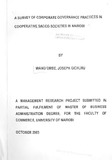| dc.description.abstract | Corporate governance is about promoting corporate fairness, transparency and accountability. This
is a subject that has attracted a lot of interest in recent years due to unprecedented corporate
collapses especially in America. Focus has been on strengthening the boards so that they can truly
direct the affairs of the corporation. The board is required to direct the affairs of the corporation but
not to manage them. Hence, there is the need to have a body responsible for governance separate
and independent of management.
In Kenya, the Co-operative Act, 1997, regulates the co-operatives.This act has defined how cooperatives
should be set up , managed and controlled. But just like other industries, regulation has
not ensured the highest standards of governance and chapter 1 has some examples of
governance problems reported co-operatives.
This study was conducted with the objective of establishing and explaining the corporate
govemance practices in the savings and credit co-operative societies (SACCOs). SACCOs form
the backbone of the co-operative movement in Kenya (Republic of Kenya, 2002). The SACCOs
main objective is the mobilization of savings and provision of credit to the members. The common
bond requirement in SACCOs is usually fulfilled when people working in the same firm or industry
get together to form a SACCO.
Three areas of governance were examined in the study. These were the independent body
responsible for governance and separate from management, the principles of corporate
govemance as postulated by the Nolan Committee (1995) and the management of the organization
VII
in accordance with the mandate of the founders. The study found that SACCOs have a big problem
as far as having an independent body responsible for governance and separate from management.
In most of the SACCOs studied, the management and the board we're one and the same.
Accountability was also found to be an area of weakness in SACCOs. The study found out that the
relatively bigger SACCOs have invested in buildings, while the smaller ones invest excess funds in
cash and near cash investments like treasury bonds and commercial paper. The SACCOs have
stuck to the mandate of the founders but the investment in illiquid and unprofitable assets like
buildings by some SACCOs has inhibited their lending capacities.
The study revealed similar management structures arising from the Co-operative Act regulation.
Regulation will therefore have to be considered in the search for better governance practices in the
SACCO sector. To overcome the problem of independent body for governance, the researcher
recommends a review of the Act with a view to changing the management structures in cooperatives.
However there is the issue of cost meaning that only co-operatives of certain sizes can
afford to have structures allowing an independent governance body separate from management.
The SACCOs studied reported that the Act has not been properly enforced and this is an issue that
the Ministry of Co-operatives need to address as well.
The study was limited to Nairobi based SACCOs due to cost and time constraints. A number of cooperatives
were not willing to participate in.the study resulting in a response rate of 62%. | en |

